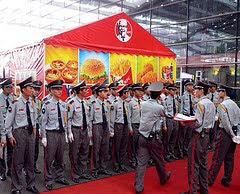
Food Fears Grow
China faces great pressure in securing its food supply in the next five years because of accelerating domestic demand, a senior official says.
Chen Xiaohua, a vice agricultural minister, says he expects China's consumption of grains to grow by 4 billion kilograms a year between 2011 and 2015.
Consumption of vegetable oil will grow by 800,000 tons a year over that period, while meat demand will rise by 1 million tons annually.
“Our country is facing great pressure in the supply of agricultural products,” the Shanghai Securities News quoted Chen as saying at an agricultural meeting.
To meet increasing demand, Chen says the government would try to boost food supply through policy measures including higher investment spending and subsidies for farming activities.
Beijing is wary of any strains to China's food supply because that could intensify already high consumer inflation, which ran at an annual pace of 4.6 percent in December, not far off from November's 28-month high of 5.1 percent.
Big City Blues
Authorities in southern China's Guangdong province deny reports of plans to unite nine towns to create the world's biggest city in the Pearl River delta, according to state media.
“The reports were totally false. There is no such plan,” Guo Yuewen, spokesman for the Communist party's provincial committee, was quoted as saying by the official China Daily.
Media had reported on a project to unite nine urban areas – including both Guangzhou and Shenzhen – into a megalopolis with a population of 42 million, according to the China Daily.
The Pearl River delta was one of the first Chinese regions to open up to foreign business in the 1980s and is now among its richest, a giant manufacturing hub that produces around 10 percent of the country's GDP.
Cash Crop Here
China has purchased more than $6.5 billion in soybeans, and the Minnesota Soybean Growers Association says this sets a good tone for the year.
“Looking forward looks great with China already purchasing this much bushels in this time of the year,” the association says, “It looks like it's going to be fantastic year for exports to China for Minnesota farmers.”
Last year, Minnesota exported around 800 million bushels, and the contract just signed with China is for over 400 million bushels – almost half of what the Chinese purchased last year – all in just the first month of 2011.
Colonel Tops Ronald
Though KFC is struggling stateside, in China it is dominating over all other fast food rivals, even global juggernaut McDonald's.
In some parts of China, the image of Colonel Sanders is more ubiquitous than Mao's, reports Bloomberg Markets magazine. That's no mean feat in a country that has proven resistant to foreign penetration.
The secret is in the sauce, using local ingredients in the food as well as its management team, building up partnerships with local suppliers and catering menus to include regional dishes.
The strategy has worked. Yum brands, which owns KFC along with Taco Bell and Pizza Hut, opens a new store in China every 18 hours and has a 40 percent market share in the country. McDonald's has just 16 percent.
Chinese KFCs offer the “Dragon Twister,” a Peking duck-sauce soaked chicken wrap, as well as spicy tofu chicken. But bending to meet local tastes doesn't just stop with the menu.
While McDonald's in America often host birthday parties, the KFCs in China advertise that they will host parties for the parents of boys who have just undergone ritual circumcision.







No comments:
Post a Comment